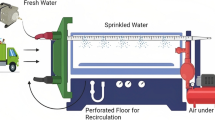
Overview
- First book to cover the organic waste composting with the nexus perspective
- Nine case studies covering Asia, Africa, Europe, and South America
- Authors share first-hand information not only on practice but also on policies
Buy print copy
Tax calculation will be finalised at checkout
About this book
This open access book starts with an introductory chapter that describes the need to bring the waste management aspects and soil nutrient management aspects of compost production into one integrated theme. The relevance of nexus thinking and the Sustainable Development Goals (SDGs) are also presented in this introduction. The first three chapters after the introduction covers composting from the solid waste management and its policy aspects, taking examples from three developing countries. The next three examples are mostly about the benefits composting can provide to the soil and agriculture. These examples are also from three developing countries, but with a mixture of urban as well as rural settings. Last three chapters present more insight into the latest developments taking examples from Europe, as well as new methods adapted from the traditional styles from Africa.
Similar content being viewed by others
Keywords
Table of contents (10 chapters)
-
Front Matter
Editors and Affiliations
About the editors
Serena Caucci is a Senior Researcher in the Waste Management Unit at UNU-FLORES. She works on academicand capacity development activities in waste management aspects within the Water-Soil-Waste Nexus, supports the process of research product development, and contributes to the ongoing capacity development work related to multi-stakeholder projects such as the Safe Use of Wastewater in Agriculture (SUWA). Before joining UNU-FLORES, Serena worked at the Institute of Hydrobiology at Technische Universität Dresden (TU Dresden) on water sanitation and antibiotic resistance in anthropogenic-driven environments. She received her master’s in environmental science from the University of Florence in Italy and PhD on environmental microbiology from TU Dresden in Germany.
Kai Schwärzel is an Academic Officer at UNU-FLORES and leads the Soil and Land-use Management unit. The overall goal of his work is to understand, quantify, and predict processes that control water and matter fluxes in variable saturated soils ranging from the plot to catchment scale. Heis using lab and field experiments, as well as numerical modeling, to deal with these problems. After completing his PhD, Dr. Schwärzel worked as a Postdoc at the Chair of Site Ecology and Soil Protection, TU Berlin. During his time at TU Berlin, his research focused mainly on the impact of dewatering of wetlands on hydraulic soil properties, water budget, trace gas fluxes, and crop yields. In 2004, Dr. Schwärzel became a Senior Researcher at the Institute of Soil Science and Site Ecology at TU Dresden. His research over the last decade has focused on the impact of soils, land use management and climate on water and matter fluxes, and related soil properties. He has studied the functions of soils under various types of land use and management with respect to flood prevention in mountainous regions and with respect to soil physical health. The work of Dr. Schwärzel combines aspects of soil physics/hydrology and soil-plant-atmosphere interactions.
Bibliographic Information
Book Title: Organic Waste Composting through Nexus Thinking
Book Subtitle: Practices, Policies, and Trends
Editors: Hiroshan Hettiarachchi, Serena Caucci, Kai Schwärzel
DOI: https://doi.org/10.1007/978-3-030-36283-6
Publisher: Springer Cham
eBook Packages: Biomedical and Life Sciences, Biomedical and Life Sciences (R0)
Copyright Information: The Editor(s) (if applicable) and The Author(s) 2020
Hardcover ISBN: 978-3-030-36282-9Published: 24 November 2020
Softcover ISBN: 978-3-030-36285-0Published: 08 December 2021
eBook ISBN: 978-3-030-36283-6Published: 23 November 2020
Edition Number: 1
Number of Pages: VIII, 232
Number of Illustrations: 3 b/w illustrations, 61 illustrations in colour
Topics: Agriculture, Waste Management/Waste Technology, Environmental Management, Environmental Policy, Sociology, general



